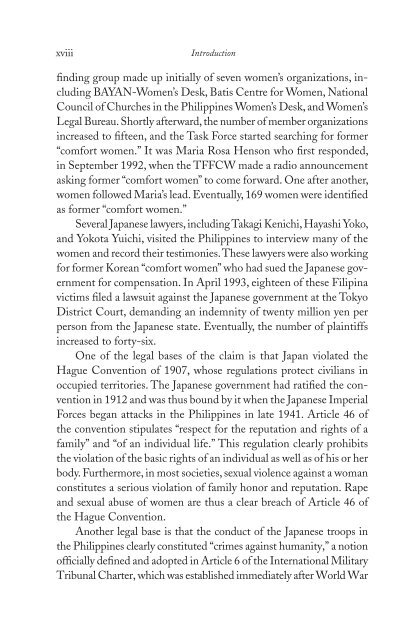Comfort Woman : a Filipina's Story of Prostitution and Slavery Under ...
Comfort Woman : a Filipina's Story of Prostitution and Slavery Under ...
Comfort Woman : a Filipina's Story of Prostitution and Slavery Under ...
Create successful ePaper yourself
Turn your PDF publications into a flip-book with our unique Google optimized e-Paper software.
xviii<br />
Introduction<br />
fi nding group made up initially <strong>of</strong> seven women’s organizations, including<br />
BAYAN-Women’s Desk, Batis Centre for Women, National<br />
Council <strong>of</strong> Churches in the Philippines Women’s Desk, <strong>and</strong> Women’s<br />
Legal Bureau. Shortly afterward, the number <strong>of</strong> member organizations<br />
increased to fi fteen, <strong>and</strong> the Task Force started searching for former<br />
“comfort women.” It was Maria Rosa Henson who fi rst responded,<br />
in September 1992, when the TFFCW made a radio announcement<br />
asking former “comfort women” to come forward. One after another,<br />
women followed Maria’s lead. Eventually, 169 women were identifi ed<br />
as former “comfort women.”<br />
Several Japanese lawyers, including Takagi Kenichi, Hayashi Yoko,<br />
<strong>and</strong> Yokota Yuichi, visited the Philippines to interview many <strong>of</strong> the<br />
women <strong>and</strong> record their testimonies. These lawyers were also working<br />
for former Korean “comfort women” who had sued the Japanese government<br />
for compensation. In April 1993, eighteen <strong>of</strong> these Filipina<br />
victims fi led a lawsuit against the Japanese government at the Tokyo<br />
District Court, dem<strong>and</strong>ing an indemnity <strong>of</strong> twenty million yen per<br />
person from the Japanese state. Eventually, the number <strong>of</strong> plaintiffs<br />
increased to forty-six.<br />
One <strong>of</strong> the legal bases <strong>of</strong> the claim is that Japan violated the<br />
Hague Convention <strong>of</strong> 1907, whose regulations protect civilians in<br />
occupied territories. The Japanese government had ratifi ed the convention<br />
in 1912 <strong>and</strong> was thus bound by it when the Japanese Imperial<br />
Forces began attacks in the Philippines in late 1941. Article 46 <strong>of</strong><br />
the convention stipulates “respect for the reputation <strong>and</strong> rights <strong>of</strong> a<br />
family” <strong>and</strong> “<strong>of</strong> an individual life.” This regulation clearly prohibits<br />
the violation <strong>of</strong> the basic rights <strong>of</strong> an individual as well as <strong>of</strong> his or her<br />
body. Furthermore, in most societies, sexual violence against a woman<br />
constitutes a serious violation <strong>of</strong> family honor <strong>and</strong> reputation. Rape<br />
<strong>and</strong> sexual abuse <strong>of</strong> women are thus a clear breach <strong>of</strong> Article 46 <strong>of</strong><br />
the Hague Convention.<br />
Another legal base is that the conduct <strong>of</strong> the Japanese troops in<br />
the Philippines clearly constituted “crimes against humanity,” a notion<br />
<strong>of</strong>fi cially defi ned <strong>and</strong> adopted in Article 6 <strong>of</strong> the International Military<br />
Tribunal Charter, which was established immediately after World War

















